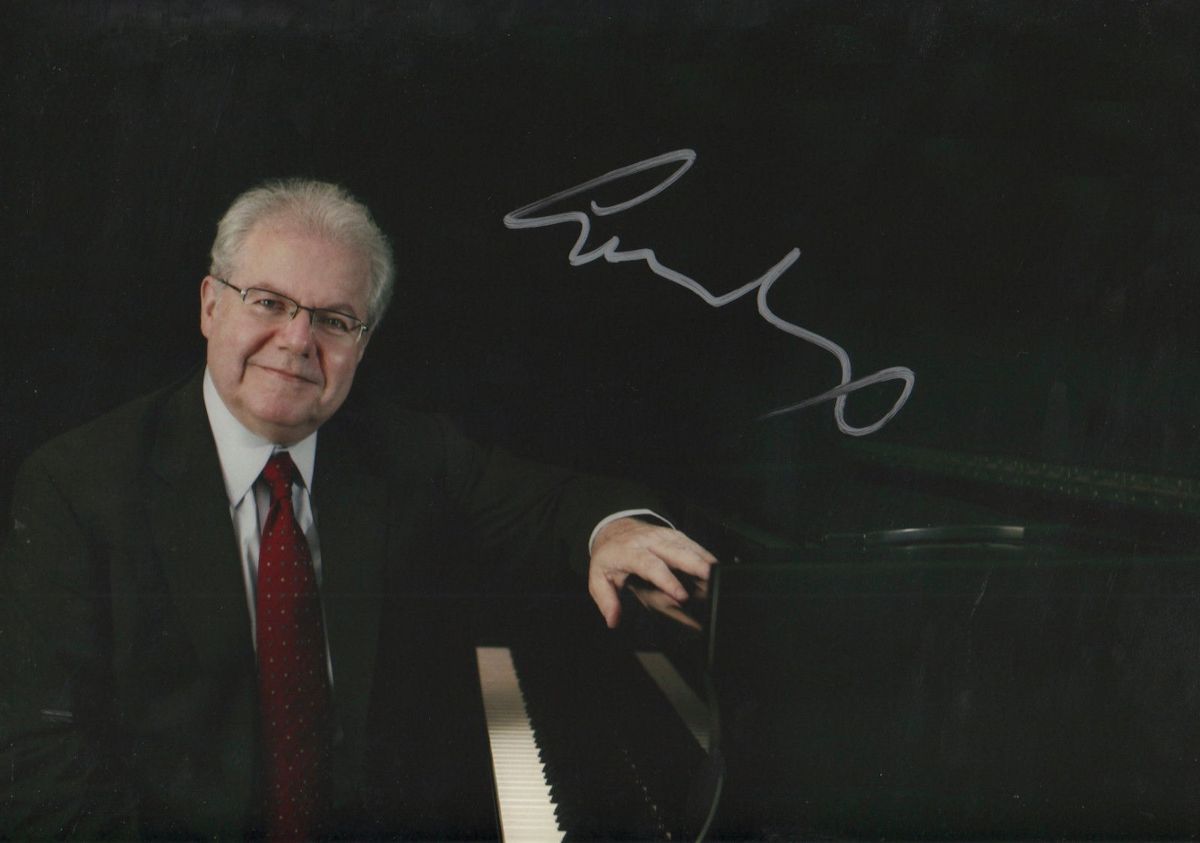

|
Born in modern day Lvov, Poland, on June 8, 1949, Emanuel Ax moved to Winnipeg, Canada, with his family when he was a young boy. His studies at the Juilliard School were supported by the sponsorship of the Epstein Scholarship Program of the Boys Clubs of America, and he subsequently won the Young Concert Artists Award. Additionally, he attended Columbia University where he majored in French. Mr. Ax made his New York debut in the Young Concert Artists Series, and captured public attention in 1974 when he won the first Arthur Rubinstein International Piano Competition in Tel Aviv. In 1975 he won the Michaels Award of Young Concert Artists followed four years later by the coveted Avery Fisher Prize. He has been on the Juilliard faculty since 1990. Always a committed exponent of contemporary composers, with works written for him by John Adams, Christopher Rouse, Krzysztof Penderecki, Bright Sheng, and Melinda Wagner already in his repertoire, most recently he has added HK Gruber’s Piano Concerto, and Samuel Adams’ Impromptus. A Sony Classical exclusive recording artist since 1987, recent releases
include Mendelssohn Trios with Yo-Yo Ma and Itzhak Perlman, Strauss’
Enoch Arden narrated by Patrick Stewart, and discs of two-piano
music by Brahms and Rachmaninoff with Yefim Bronfman. In 2015 Deutche
Grammophon released a duo recording with Mr. Perlman of Sonatas by Faure
and Strauss, which the two artists presented on tour during the 2015/2016
season. Mr. Ax has received GRAMMY® Awards for the second and third
volumes of his cycle of Haydn’s piano sonatas. He has also made a series
of Grammy-winning recordings with cellist Yo-Yo Ma of the Beethoven and
Brahms sonatas for cello and piano [recording booklet cover shown below].
His other recordings include the concertos of Liszt and Schoenberg, three
solo Brahms albums, an album of tangos by Astor Piazzolla, and the premiere
recording of John Adams’s Century Rolls with the Cleveland Orchestra
for Nonesuch.
In the 2004/05 season Mr. Ax contributed to an International EMMY® Award-Winning BBC documentary commemorating the Holocaust that aired on the 60th anniversary of the liberation of Auschwitz. In 2013, Mr. Ax’s recording Variations received the Echo Klassik Award for Solo Recording of the Year (19th century music/Piano). A frequent partner for chamber music, he has worked regularly with such artists as Young Uck Kim, Cho-Liang Lin, Mr. Ma, Edgar Meyer, Peter Serkin, Jaime Laredo, and the late Isaac Stern. Mr. Ax resides in New York City with his wife, pianist Yoko Nozaki.
They have two children together, Joseph and Sarah. He is a Fellow of
the American Academy of Arts and Sciences and holds honorary doctorates
of music from Skidmore College, Yale University, and Columbia University. -- Names which are links refer to my interviews
elsewhere on my website. BD |
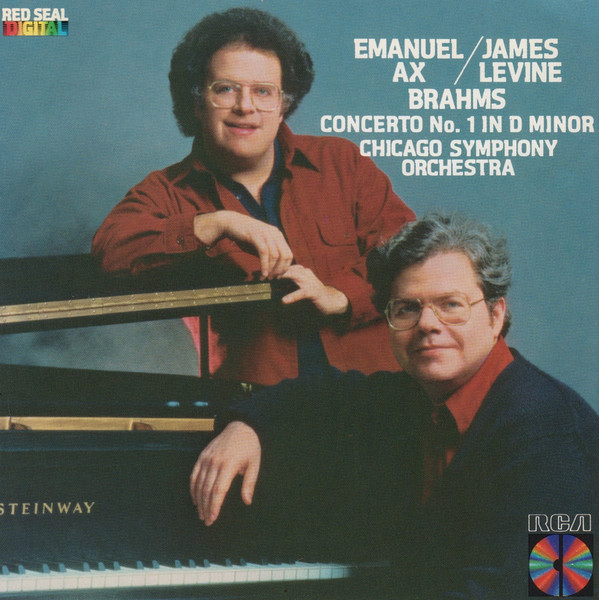 Ax had commissioned the work, and had premiered it and recorded
it two years previously with the Cleveland Orchestra led by Christoph von Dohnányi.
He also played it with the London Symphony led by the composer
in 1998.
Ax had commissioned the work, and had premiered it and recorded
it two years previously with the Cleveland Orchestra led by Christoph von Dohnányi.
He also played it with the London Symphony led by the composer
in 1998. 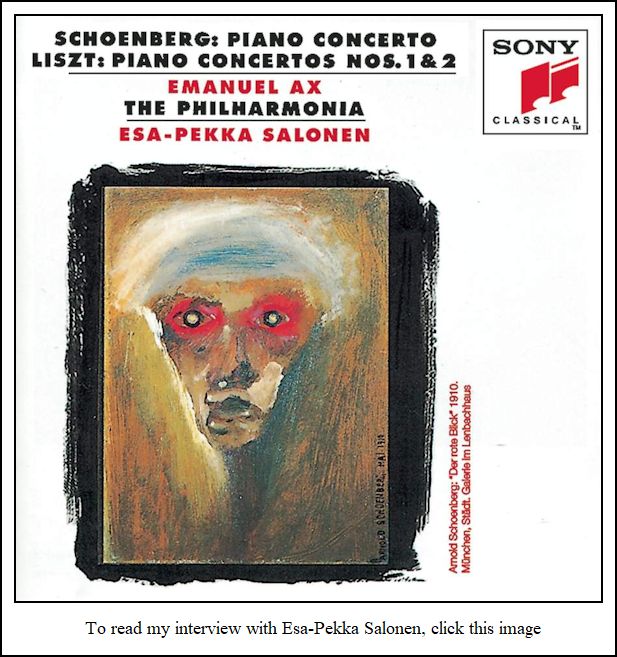 EA: It’s important that there be
something that draws me, or the orchestra, or the audience to the piece.
It’s hard to explain, but the Schoenberg Piano Concerto, which
I've played quite a lot [shown at right], is a piece audiences
don’t readily take to. But I’ve become very involved with it, and
I like playing it, and orchestras find it intriguing. He’s an important
composer, and ultimately, audiences find something to come back to in
that piece. It’s not so much that they have to like it, but there
should be something that grabs somebody.
EA: It’s important that there be
something that draws me, or the orchestra, or the audience to the piece.
It’s hard to explain, but the Schoenberg Piano Concerto, which
I've played quite a lot [shown at right], is a piece audiences
don’t readily take to. But I’ve become very involved with it, and
I like playing it, and orchestras find it intriguing. He’s an important
composer, and ultimately, audiences find something to come back to in
that piece. It’s not so much that they have to like it, but there
should be something that grabs somebody.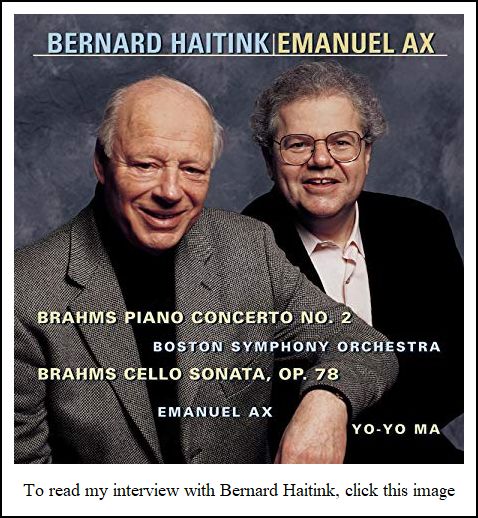 BD: It’s the first one we
get to?
BD: It’s the first one we
get to?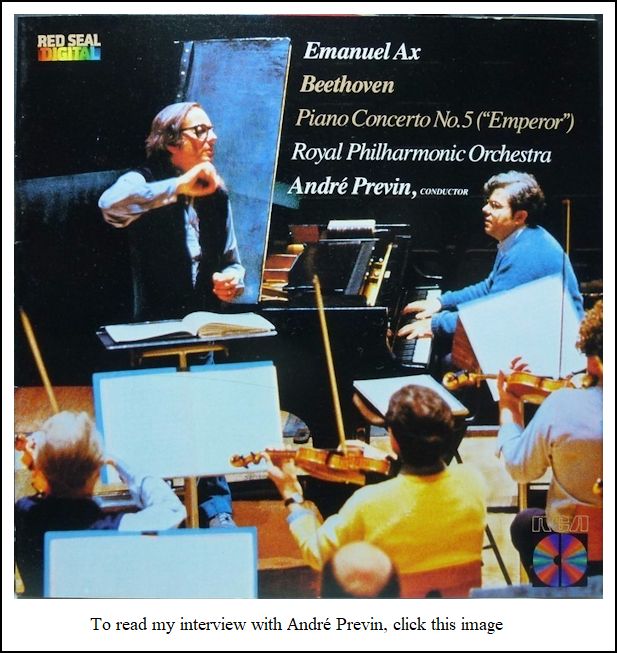 BD: I hope this translates into bodies in seats at
concerts.
BD: I hope this translates into bodies in seats at
concerts.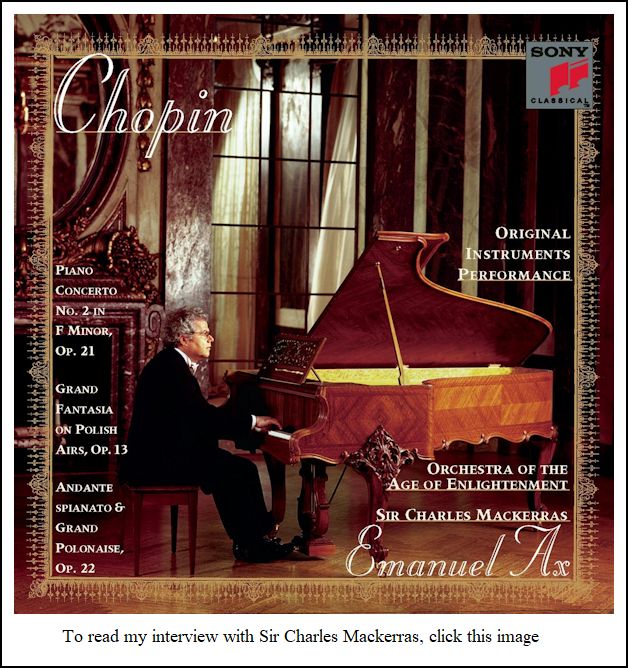 BD: You wouldn’t rather just go into the studio,
play it twice and hope they can cover all the mistakes?
BD: You wouldn’t rather just go into the studio,
play it twice and hope they can cover all the mistakes?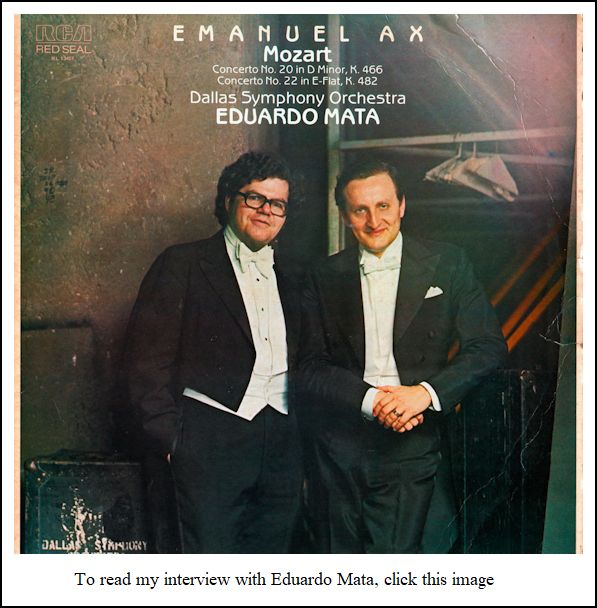 BD: You’re the master?
BD: You’re the master?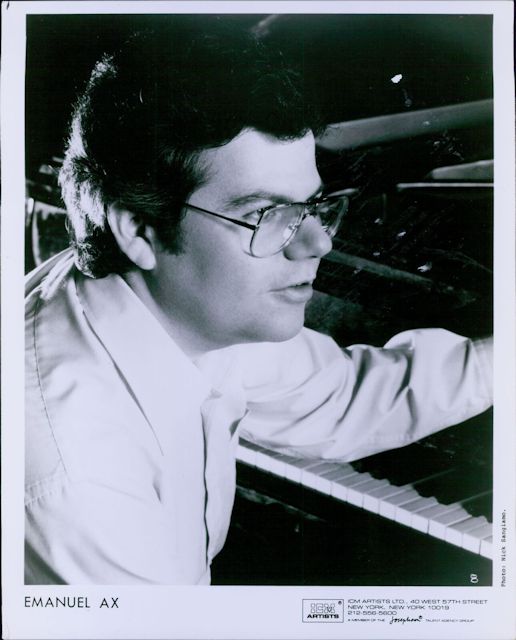 BD: When you play a concerto, do you try to get it to
be like chamber music?
BD: When you play a concerto, do you try to get it to
be like chamber music?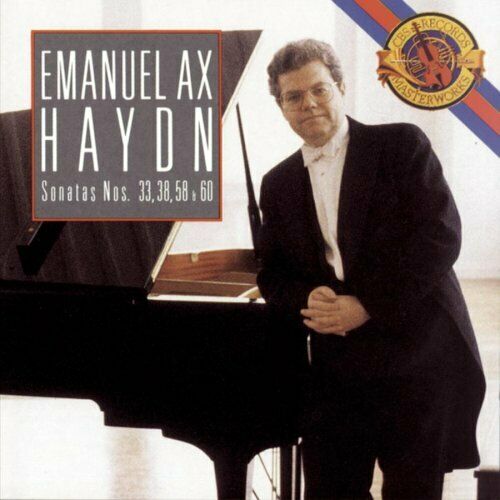 BD: Is it safe to assume that you like
the pieces you keep in your repertoire?
BD: Is it safe to assume that you like
the pieces you keep in your repertoire?© 1999 Bruce Duffie
This conversation was recorded at Orchestra Hall in Chicago on April 15, 1999. Portions were broadcast on WNIB two months later, and on WNUR in 2004. That program was also featured as a podcast during 2010. This transcription was made in 2019, and posted on this website at that time. My thanks to British soprano Una Barry for her help in preparing this website presentation.
To see a full list (with links) of interviews which have been transcribed and posted on this website, click here.
Award - winning broadcaster Bruce Duffie was with WNIB, Classical 97 in Chicago from 1975 until its final moment as a classical station in February of 2001. His interviews have also appeared in various magazines and journals since 1980, and he now continues his broadcast series on WNUR-FM, as well as on Contemporary Classical Internet Radio.
You are invited to visit his website for more information about his work, including selected transcripts of other interviews, plus a full list of his guests. He would also like to call your attention to the photos and information about his grandfather, who was a pioneer in the automotive field more than a century ago. You may also send him E-Mail with comments, questions and suggestions.